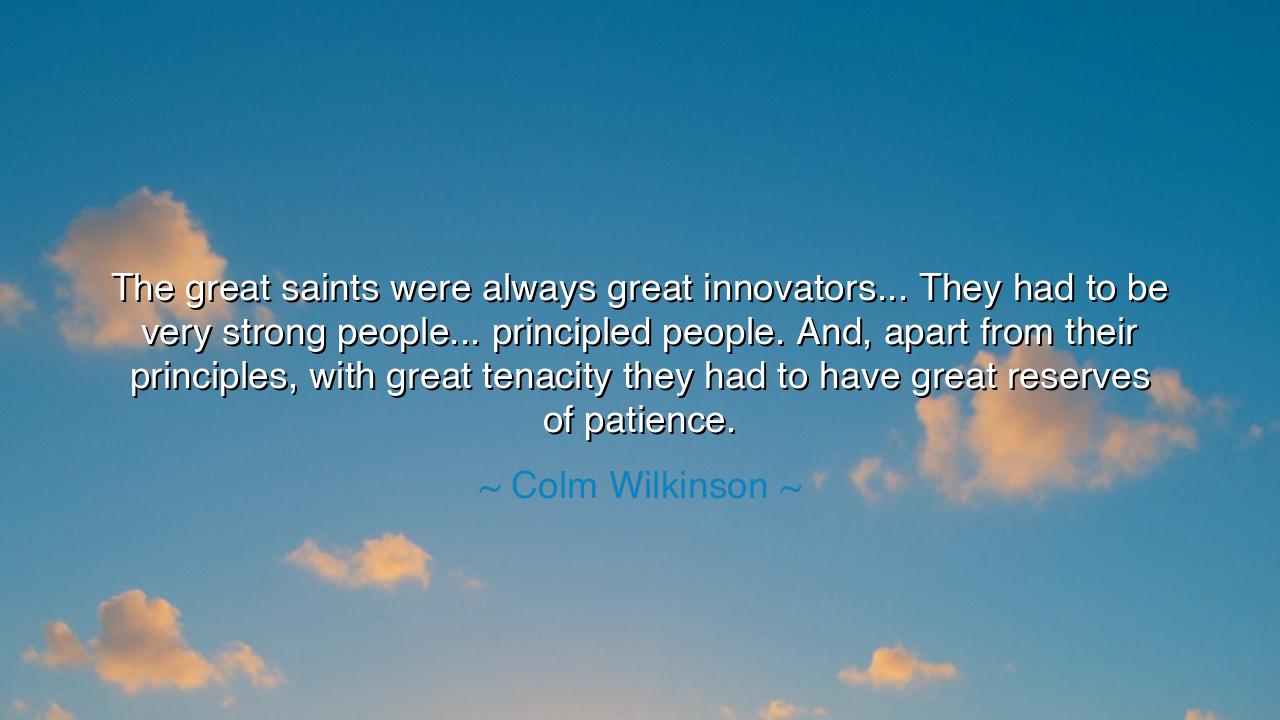
The great saints were always great innovators... They had to be
The great saints were always great innovators... They had to be very strong people... principled people. And, apart from their principles, with great tenacity they had to have great reserves of patience.






Hear the words of Colm Wilkinson, spoken with the weight of reverence: “The great saints were always great innovators… They had to be very strong people… principled people. And, apart from their principles, with great tenacity they had to have great reserves of patience.” This is no mere reflection on the past, but a song of truth about all who dare to change the world. For those who walk the path of holiness, of vision, of transformation, are never passive imitators. They are innovators, blazing new trails where none dared tread, guided by strength, principles, and the steady lamp of patience.
The ancients knew this well. Moses was not only a prophet, but an innovator, leading a people from bondage into freedom, giving them law and covenant that reshaped their destiny. Siddhartha, who became the Buddha, broke from the traditions of his princely life, venturing into paths of renunciation no one around him understood. Christ himself, greatest of the saints, overturned customs, laws, and hardened hearts, teaching love where vengeance had ruled, humility where pride reigned. These were no weak souls, but strong people, whose courage to stand apart made them innovators of faith, justice, and spirit.
But strength alone would not have sufficed. As Wilkinson reminds us, the great saints were also principled. Their lives were not tossed like ships upon the waves, but anchored in conviction. Joan of Arc, though a young maiden, bore her principles to the flames, refusing to betray the visions that guided her. Martin Luther, standing before the Diet of Worms, declared, “Here I stand; I can do no other.” Such firmness of principle is the armor without which innovators falter, for every new path will be tested by fire.
Yet even strength and principles are not enough. Wilkinson names the final jewel: patience. For all great transformations are slow. A forest does not grow in a day, nor does the heart of a people change with a single sermon. The saints bore insults, rejections, and long years of obscurity. Mother Teresa labored in the streets of Calcutta not for days, but for decades, holding fast with quiet patience until her work shone like light before the nations. Without such endurance, the fires of innovation would die out before they bore fruit.
The meaning of Wilkinson’s words is thus profound: greatness is not a gift, but a labor. To be a true innovator—whether in faith, in art, in justice, or in knowledge—one must possess the triad of strength, principles, and patience. The world does not yield easily to change. It mocks the new, it resists the just, it persecutes the bold. Only those who carry within themselves the steel of tenacity and the calm of waiting can endure long enough to leave behind a legacy.
Consider then your own path. You need not wear the name of saint to live by these truths. Whatever your calling—whether to create, to lead, to heal, or to teach—you will face resistance. Be strong, so you are not crushed. Be principled, so you do not betray yourself. Be patient, so that time itself becomes your ally. This is the way of those who change the world, whether on great stages of history or in quiet corners unseen.
Practical actions lie before you: strengthen your spirit daily, for courage is a muscle trained by small acts. Define your principles clearly, so that when trials come you do not falter. Cultivate patience, not as passive waiting, but as active endurance—the steady hand that continues the work even when results are distant. In this way, you follow the path of the great innovators of old, shaping not only your life, but the lives of all who come after you.
Thus let Wilkinson’s words ring like a timeless teaching: the saints of the past were not cloistered dreamers, but innovators who dared, who endured, and who triumphed. And so too can you, if you bear strength, principles, and patience as your companions on the journey of life. For these three are the keys not only to sanctity, but to all lasting greatness.






AAdministratorAdministrator
Welcome, honored guests. Please leave a comment, we will respond soon